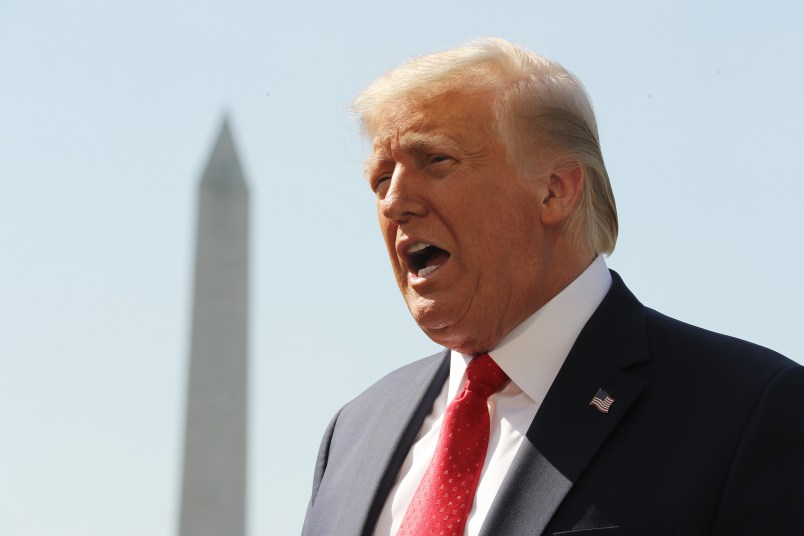President Trump and the House Oversight Committee not surprisingly have very different ideas for what should happen next in his lawsuit challenging the lawmakers’ subpoena for his financial documents.
The litigation is continuing after the Supreme Court earlier this summer rejected Trump’s arguments that Congress lacked the authority to demand the documents. But rather than outright back the enforcement of the House subpoenas, the justices in a 7-2 vote laid out a four-part test that should be used to decide whether a congressional subpoena of a President’s personal information is legitimate.
The case — known as Trump v. Mazars, because Trump had brought the lawsuit against his accounting firm Mazars USA LLP to stop it from complying with the subpoena — is now back before the U.S. Court of Appeals for the D.C. Circuit, which had previously ruled in the House’s favor.
In dueling briefs filed Monday evening, the House laid out all the reasons why its subpoenas met the Supreme Court’s four-part test, while Trump — who is suing Mazars in his personal capacity — argued that the subpoenas currently meet none of the four requirements.
The House told the appeals court that it should resolve the remaining legal issues itself without sending the case back to the district court. It also included a new, 58-page memo issued by House Oversight Chairwoman Carolyn Maloney that went into more detail about how obtaining the documents would help the lawmakers draft various pieces of legislation
Trump, meanwhile, is pushing for the D.C. Circuit to either send back the case to the district court or, alternatively, to rule in Trump’s favor and reverse its initial judgement backing the subpoenas.
A similar battle is ongoing in New York, albeit at a much quicker pace, over a subpoena a New York grand jury issued for Trump’s financial records. The Supreme Court heard Trump’s challenge to that subpoena as well last spring, and it also rejected Trump’s arguments that the presidency made him immune from state criminal investigations.
On Tuesday morning, the U.S. Court of Appeals for the 2nd Circuit heard arguments over whether to put on hold a new district court ruling ordering that Trump’s financial firms comply with the subpoenas while Trump appeals the ruling on the basis of arguments he didn’t present yet to the Supreme Court.
Even if the New York investigation — which is being led by Manhattan District Attorney Cy Vance — gets its hands on Trump’s financial docs before the election, it is extremely unlikely they’ll be made public ahead of Nov. 3, due to the secrecy requirements around grand jury materials that usually limit their disclosure to court proceedings.
Likewise, the House faces tight deadlines on obtaining the records. Its filing Monday noted that the potential that Trump will run down the clock until the end of this Congress early next year.
“If this Court does not resolve this case now, the Trump Plaintiffs will almost certainly have succeeded in blocking the 116th Congress from obtaining any documents pursuant to its subpoena,” the filing said.
Read both the House and Trump filings below:







The NYT’s exposé about the Trump family’s repeated and decades long tax evasion/fraud schemes and other recent dubious financial dealings…is reason enough to grant Congress access to Trump’s financial records. Period.
Cliched but so true with all the trumpian delay in bad faith = Justice delayed is justice denied!
“If this Court does not resolve this case now, the Trump Plaintiffs will almost certainly have succeeded in blocking the 116th Congress from obtaining any documents pursuant to its subpoena,” the filing said.
To cut to the chase, could we just have an actual duel?
Fat Nixon and Adam Schiff at 10 paces with golf putters?
WASHINGTON (The Borowitz Report)—Pushing back against attempts to brand the United States of 2020 as “Trump’s America,” Donald Trump said that he deserves no blame for the state of the country, because he has not actually done any work for the past four years.
“I could understand people blaming me for things if I had actually been doing my job, but, quite frankly, I haven’t,” he said. “Anybody who claims otherwise is a terrible person.”
“CNN, which is a disgrace, says that it’s the White House’s fault for this and the White House’s fault for that,” he added. “Well, I’ve hardly been at the White House, so, once again, they’re wrong.”
Attempting to answer the question of whose America it is, if not his, Trump said, “The last President who actually worked at the White House was Barack Obama. So if this is anybody’s America it’s his and Sleepy Joe’s. People are saying that. They’re sick of living in Biden’s America, and we cannot give Joe Biden another four years.”
He rejected any suggestion that, as President, he must own the current conditions in America, asserting, “I know what I own and what I don’t own. I own Bill Barr. I own Mitch McConnell. I don’t own America.”
@irasdad
Fat Nixon with a putter and Adam Schiff armed with lines from The Big Lebowski, “Shut the fuck up, Donny.”